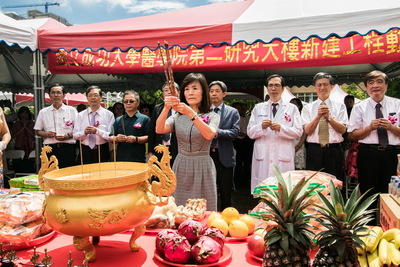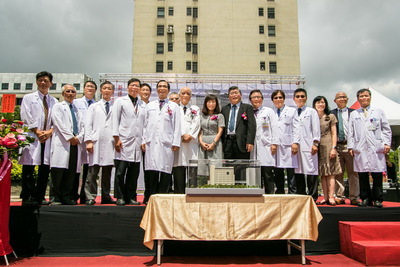Groundbreaking of NCKU College of Medicine’s Second Research Building: Renewed Focus on Developing Geriatric Research [news center]

Having entered the 35th year since its founding, National Cheng Kung University’s College of Medicine started a new chapter in its development, specifically the construction of the College’s Second Research Building which broke ground on August 3rd. The facilities in this $840 million-NTD and 11-story research building will primarily be dedicated to geriatric research, which is in line with the current trend of global medical development. The project draws together the combined resources of the University’s administration, the College of Medicine as well as the NCKU Hospital’s wealth of experience with clinical medicine, in order to engage in cross-field research on the development and application of medical technology in geriatrics. In addition, with the construction of the University’s smart hospital for the elderly on the horizon, NCKU is poised to become an important node for geriatric research in Taiwan and a leader in the development of smart cross-field geriatric treatments.
At 10 am on August 3rd, NCKU President Dr. Huey-Jen Jenny Su led university officials, including NCKU Vice President Cheng-hung Huang, Dean of the College of Medicine Dr. Jang-Yang Chang, and Superintendent of NCKU Hospital Chyun-Yu Yang, in the groundbreaking ceremony where prayers and rites were performed for the smooth and successful construction of the research building. Over a hundred people were in attendance at the ceremony, including Tainan City Government Health Bureau Director Yi Chen, Academia Sinica scholar Wen-Chang Chang, MOHW Tainan Hospital Superintendent Bor-Shyang Sheu, and distinguished professor Ih-Jen Su from Southern Taiwan University of Science and Technology.
NCKU College of Medicine’s Second Research Building will be built on NCKU’s Cheng-Hsing Campus. The company RC will be handling the construction of the building. The building’s total floor area will amount to 8,200 ping. The construction is projected to be completed by October 2021. As for the floor plan, the first and second floors will be designated for classrooms. From the third floor up, the space will be used for research rooms and laboratories. On the fourth floor, a sky way will connect the Second Research Building to the existing College of Medicine Building. After construction is completed, the existing College of Medicine Building and the Second Research Building will operate in tandem and complement each other with the former serving the needs of the College of Medicine and the latter providing medical and inpatient services. The union of the two buildings will establish seamless connectivity between medical research and applications of that research in treatments and services.
In NCKU President Huey-jen Jenny Su’s opening remarks at the ceremony, she touched on her own experiences serving as a faculty member in the College of Medicine: “I can personally attest to the valiant efforts of three university presidents and many College of Medicine deans towards realizing this project. I also appreciate the financial support from Premier William Ching-te Lai and many others from various fields. The journey getting to this point, to the groundbreaking of the Second Research Building, has not been an easy one. But we’re finally here, and I am moved beyond words.” Dr. Su illumined the considerable efforts that went into the 20 years of planning and fundraising where many faculty members, including herself, donated out-of-pocket to the project as a gesture of support and goodwill. During space allocation planning for the new building, faculty and staff at the College of Medicine reached a consensus to keep the working spaces small and suitable for lab work. The amenities and the quality of the facilities will serve as a model in Taiwan. Dr. Su ended her remarks on a high note: “NCKU’s College of Medicine will surely not disappoint all of its supporters. As a center for medical practice and research, the college will continue its high performance in providing services to the public, for the benefit of the people and to the hope of Taiwan.”
In Dr. Jang-Yang Chang’s remarks, he announced plans to add a seventh department—the Department of Dentistry—to the College of Medicine in the 2019 academic year, which would expand the scope of the College’s curriculum to all major areas in the field of medicine. Moreover, in light of the construction of the smart geriatric hospital set to break ground next year, the future of NCKU’s College of Medicine has never looked brighter and more promising.
More importantly, the College of Medicine is ready to deal with the challenges ahead. Taiwan has the most rapidly ageing population in the world, and the College of Medicine is faced with major challenges stemming from this issue, including treating geriatric diseases and illnesses, developing preventative strategies, customizing medical treatments, and planning in-home care programs. The Second Research Building has two main objectives. The first being geriatric research, which includes translational research, clinical research, geriatric care, development of geriatric medical technology, academic theories for policies on caring for the aging population, and elderly-related welfare research. The second objective is to advance the development and clinical applications of pharmaceutical science and technology, including research on pharmacokinetics, pharmaceutical manufacturing, and pharmaceutical care.

The dean of the College of Medicine Dr. Jang-Yang Chang said that the Second Research Building would help alleviate the College’s issue of crowdedness which comes from having to accommodate over 400 staff members in limited space, simultaneously conducting medical R&D. Dr. Chang hopes that the new building will be able to meet the developmental demands of the next couple decades. He also jokingly remarked that after the building is completed there will no more passing the buck for any failed or unsatisfactory research results going forward.
NCKU’s College of Medicine Building was constructed in August 1983, and is one of 14 major national architectures that was built in the early years of Taiwan’s government. In that same year, the College inaugurated its first class of 50 students into the program, and has gone on to matriculate many more classes since then. The current Premier William Ching-te Lai is an alumnus of the College, having graduated with the Class of 1991. The 35-year-old College of Medicine has since expanded from its initial singular department of medicine into six specializations, which are general medicine, pharmacy, nursing, physical therapy, occupational therapy, and medical laboratory science and biotechnology. Coming soon in 2019, the brand new Department of Dentistry will take its place as the seventh department in the College. The construction of the Second Research Building is the first major construction project since the establishment of the National Cheng Kung University Hospital in 1988.
Provider: news center




